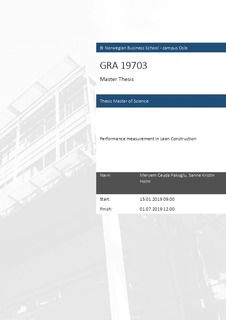Performance measurement in Lean Construction
Master thesis
Permanent lenke
http://hdl.handle.net/11250/2626141Utgivelsesdato
2019Metadata
Vis full innførselSamlinger
- Master of Science [1622]
Sammendrag
The construction industry accounted for approximately 16% of Norway's GDP in
2018, and a well-functioning and efficient industry is thus of great importance (Øye,
2019). However, it is commonly recognized that the productivity and efficiency in
the construction industry have been stagnated for a long time. As a result, more
attention has been drawn towards figuring how to counteract this negative trend.
During the past two decades, Norwegian construction companies have implemented
various practices and methodologies aimed at their performance, where one of these
practices is the Lean methodology. During this period, the Lean Construction has
grown in prominence and is considered one of the most appropriate initiatives to
improve performance. In addition, some researchers have claimed that by
conducting performance measurements, it is possible to identify areas for
improvements. Thus, this thesis will try to gain a better understanding of how
performance measurement is used in Lean Construction by investigating the formal
structures implemented and used for measuring performance and how this is
affected by informal conditions. Hence, our research aims to answer the following
two research question:
- How is performance measured in Lean Construction?
- Why, or why not, should performance be measured in Lean Construction?
Our research is based on an exploratory case study of Veidekke ASA, where Lean
Construction has been used since early 2000. This has provided us with an in-depth
understanding of the phenomenon by conducting 18 semi-structured interviews, six
observations, and participation at LC-NO seminars.
The findings from our research revealed that tools and systems must be used
adequately and in a coherent matter to conduct performance measurements with
the aim for continuous improvement. Moreover, informal conditions must be
taken into consideration and focused upon in order to optimize the potential
outcome. However, our thesis concludes that there is not a yes/no answer to the
question of if performance measurements are in accordance with Lean thinking.
This is because our findings demonstrate that this highly depends on several
aspects and conditions that need to be addressed, such as what the goal of the
measurements is.
Beskrivelse
Masteroppgave(MSc) in Master of Science in Business, Logistics, operations and supply chain management - Handelshøyskolen BI, 2019
